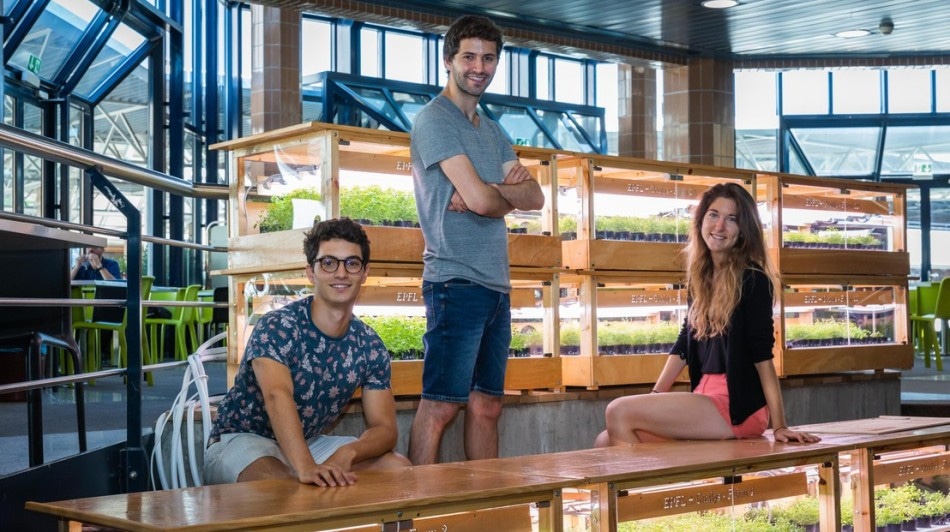Aug 5 2019
A technology for growing a small garden right in an office or home has been co-developed by two EPFL Master’s students.
 The modules are being tested on the EPFL campus. (Image credit: EPFL 2019/Jamani Caillet)
The modules are being tested on the EPFL campus. (Image credit: EPFL 2019/Jamani Caillet)
They introduced a startup to market their smart indoor greenhouses and set up prototypes at EPFL with the support of the Act for Change LAB platform (EPFL Sustainability).
Caulys, a startup co-developed at the start of 2019 by two EPFL Master’s students, is getting ready to market connected indoor greenhouses that allow people to grow their own lettuce, basil, or strawberries—even in the center of a city.
Their objective is to help urbanites turn producers of fresh local vegetables and fruits. Simply put, to “bring agriculture downtown” by equipping apartments and other buildings with their own tiny gardens.
The startup’s systems function autonomously and have a modular design. By enabling consumers to grow their own yield, there is no need for pesticides, plastic packaging, and GMOs—and the carbon emissions linked to shipping food over long distances is prevented. Furthermore, they enhance the traceability of food.
Most of the fruits and vegetables we see at the supermarket were selected not for their taste and nutritional value, but for their resistance to disease and shipping-related damage. What’s more, nearly half of it goes bad along the way.
Grégoire Gentile, Master’s student, Mechanical Engineering, EPFL
Gentile is the co-founder and CEO of the startup company, Caulys.
Optimal Conditions for Plant Growth
The technology includes modules; each system can include up to four shelves and accommodate 200 plants. LEDs and sensors constantly track and adjust the systems’ temperature, light, and humidity to develop just the appropriate conditions for the growing plants. Moreover, since the soil is watered using a closed-loop irrigation system, Caulys’ greenhouses use up to 95% less water than traditional farming methods.
There soon won’t be enough arable land left on our planet to feed the whole population. Greenhouses like ours could be used to supplement traditional farms.
Tom Lachkar, Master’s Student, Bioengineering, EPFL
Lachkar is also co-founder and head of business development of Caulys.
Just Plug it in and Add Water
One great benefit of Caulys’ greenhouse is its user-friendliness. One has to just plug it in, place a soil unit—containing a natural substrate, seeds, and nutrients—in each shelf, and fill the reservoir with water. After that, one can just sit back and see their plants grow. However, it is necessary to add fresh water to the reservoir occasionally.
“We imagine people wouldn’t need to spend more than 20 minutes a week maintaining their gardens,” states Grégoire Gentile.
The team tested its greenhouses by setting up 18 systems with 50 plants each in an EPFL cafeteria where they are being used to cultivate arugula, radishes, and basil microgreens.
These tests are being performed with the help of the campus’ sustainable projects platform, Act for Change LAB, and the EPFL Sustainability unit. The company’s next step will be to cultivate herbs, lettuce, and small vegetables and fruits.
“The start-up has carried out a first Life Cycle Analysis. The results obtained are very encouraging,” states Tom Lachkar, “the use of Caulys greenhouses would allow us to consume fruit and vegetables with a lower CO2 impact than the majority of the circuits currently used.”
Caulys expects to introduce its greenhouses on the market later this year at a cost of approximately CHF 3,000 for a four-shelf unit. With regards to power consumption, a two-shelf unit should consume about 840 kWh a year—the same as two standing halogen lamps.
With this invention, the team has already bagged the Young Entrepreneur Prize, which included CHF 10,000 in prize money, and an XGrant, also worth CHF 10,000. Caulys, which is based at UniverCité in Renens, is supported by Genilem and joined MassChallenge Switzerland acceleration program in 2018.
Connected greenhouse to bring agriculture in cities
(Video credit: EPFL)